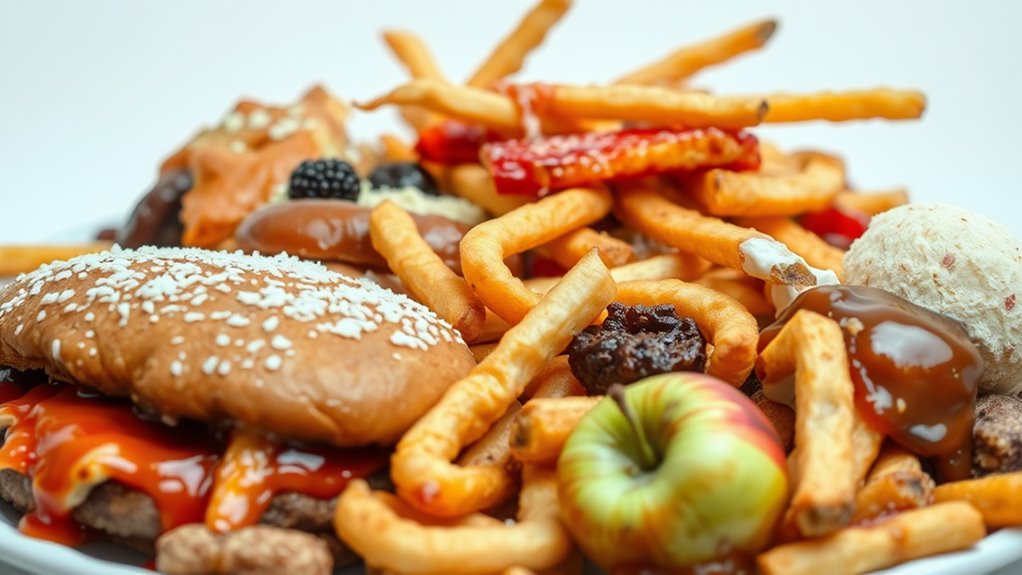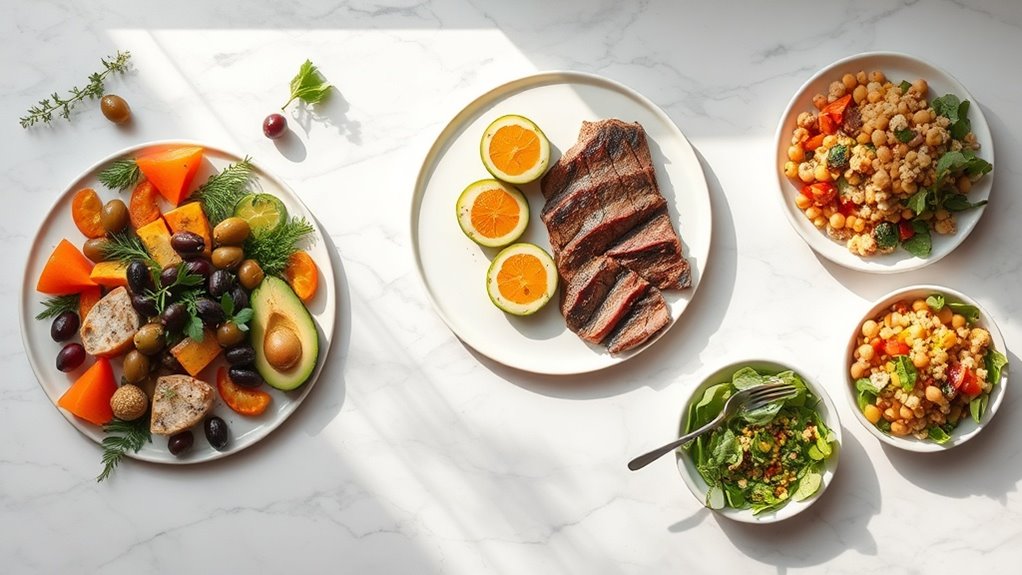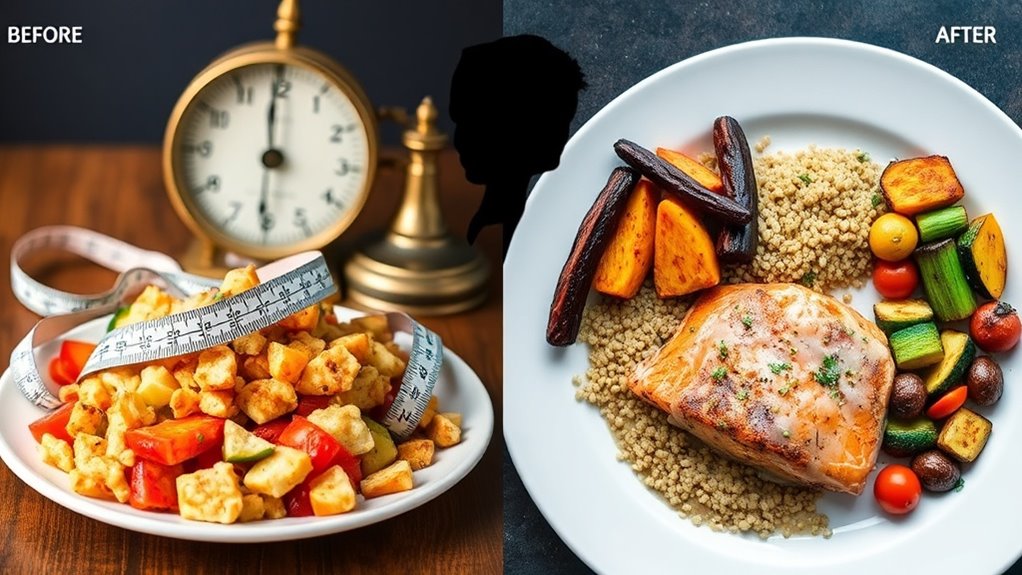Is Your Diet Making You FAT. The Hidden Dangers of Certain Foods
Your diet might be making you fat without you realizing it. Many foods labeled as “healthy” can be misleading, packed with hidden sugars and artificial additives that sabotage your weight loss goals. Low-fat products often contain more sugar than their full-fat counterparts, leaving you unsatisfied. Additionally, portion sizes can trick you into overeating. Emotional eating can further complicate your journey to health. There’s more to uncover about these hidden dangers and how to avoid them.
The Myth of “Healthy” Processed Foods
How often do you reach for a snack labeled as “healthy” only to discover it’s not quite what it seems? You’re not alone in your quest for wholesome options, yet many of those processed foods can lead you astray.
These snacks often contain hidden ingredients that may sabotage your efforts, making diets that make you gain weight more common than you think. You might believe you’re making the right choice, but those “low-fat” or “organic” labels can be misleading.
They often replace sugar with artificial additives or unhealthy fats, which can derail your progress. Instead of feeling empowered by your choices, you may find yourself frustrated and unsure. Many “healthy” labeled products may contain hidden sugars that can contribute to excessive calorie consumption.
To truly nourish your body, embrace whole foods whenever possible. By educating yourself about what’s truly healthy, you can connect with others who share your journey and create a community rooted in genuine wellness.
Hidden Sugars: The Sweet Saboteurs
Have you ever checked the ingredients of your favorite snack only to find a laundry list of sugars hiding in plain sight? You’re not alone; many of us fall for the allure of sweet flavors without realizing what’s really in our food.
These hidden sugars often come under different names—like high-fructose corn syrup, cane sugar, or agave nectar—making it tricky to spot them.
When you indulge in seemingly innocent treats, these sweet saboteurs can sneakily sabotage your health goals. They can spike your blood sugar, leading to cravings and unnecessary weight gain. Many commercial frozen meals also contain hidden sugars that inflate calorie counts, making it harder to maintain a healthy diet.
It’s all too easy to feel overwhelmed, but remember, you’re part of a community that values mindful eating. By reading labels and choosing whole foods, you can reclaim your diet and foster a healthier lifestyle.
Together, let’s navigate this sugary maze and support one another in making better choices for our well-being!
The Truth About Low-Fat and Diet Products
While low-fat and diet products may seem like a healthier choice, they often come with their own set of hidden pitfalls. Many of these items are loaded with artificial sweeteners and additives that can confuse your body and cravings, leaving you hungrier and more unsatisfied. You might think you’re making a smart decision, but these products can lead you to consume more calories overall.
Plus, the reduced fat often means added sugars to enhance flavor, which can sabotage your diet efforts. In fact, many low-fat yogurts contain higher sugar levels to compensate for the fat loss, further undermining your healthy eating intentions.
In your quest for belonging and a healthier lifestyle, it’s important to question what’s really in those low-fat labels. Instead of relying on these products, focus on whole, nutrient-dense foods that nourish your body and keep you satisfied.
Embrace the idea that balance, rather than deprivation, can help you connect with others who share your journey toward better health.
Portion Sizes: The Silent Weight Gainer
Even if you’re mindful of what you eat, portion sizes can quietly sabotage your weight loss efforts. You mightn’t realize how much those servings can add up.
Here are three ways to stay aware of your portions:
-
Use Smaller Plates****: Switching to a smaller plate can trick your mind into thinking you’re eating more. It’s a simple yet effective way to manage portion sizes without feeling deprived.
-
Measure Your Food: Take the time to measure out your food, especially snacks. You’d be surprised at how quickly those “just a handful” servings can balloon.
-
Practice Mindful Eating****: Slow down and savor each bite. This helps you recognize when you’re full, reducing the chances of overeating. Additionally, practicing mindful eating enhances satisfaction with smaller portions, making it easier to stick to your weight loss goals.
The Impact of Emotional Eating on Your Diet
When stress or strong emotions hit, many people turn to food for comfort, which can derail even the best diet plans. You might find yourself reaching for that pint of ice cream or a bag of chips, believing it’ll make you feel better.
But the temporary relief often leads to guilt and regret, creating a cycle that’s hard to break. Emotional eating doesn’t just affect your waistline; it impacts your overall well-being. Instead of addressing feelings, you’re masking them with food.
This habit can leave you feeling isolated, as it’s easy to believe others wouldn’t understand your struggles. To combat this, try finding healthier ways to cope—like talking to friends, journaling, or exercising. Extreme dieting can also lead to unhealthy relationships with food, making it crucial to develop a balanced approach.
Connecting with others who share similar experiences can provide support and understanding. Remember, you’re not alone in this journey, and there are better paths to emotional fulfillment than food.





